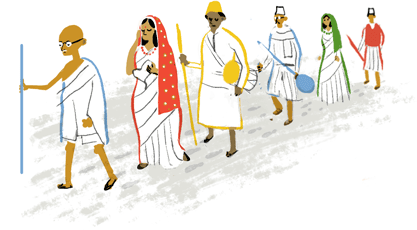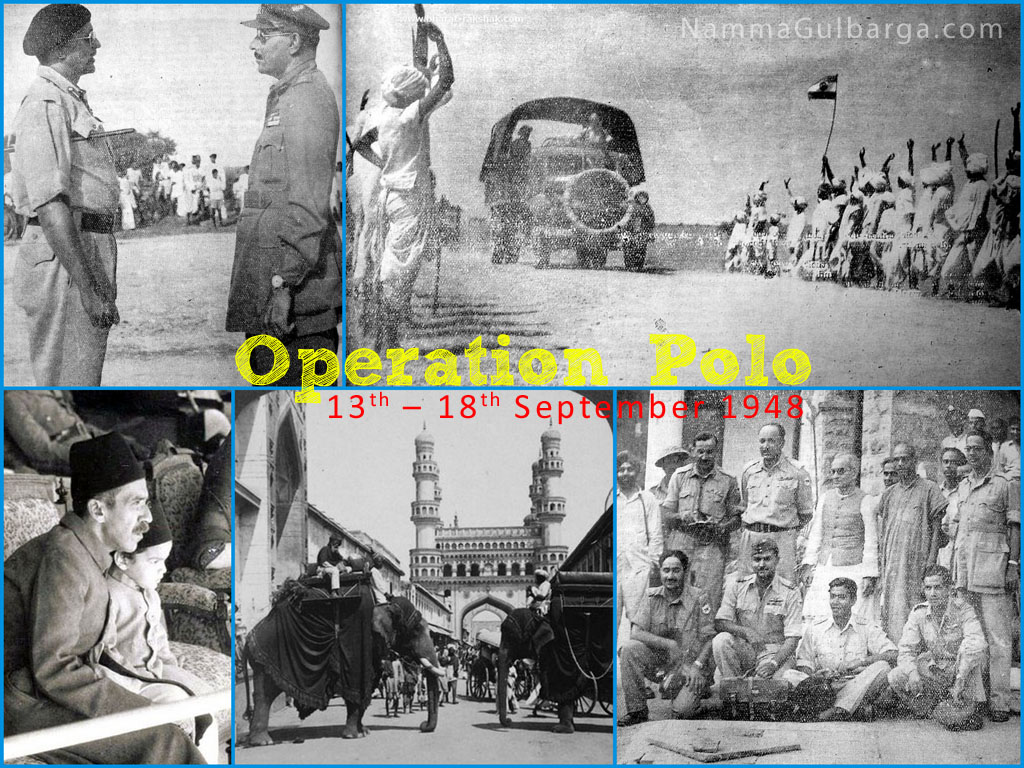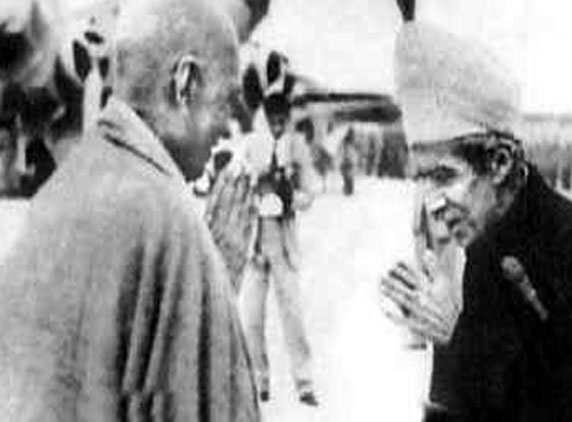
| COMMENTS FROM INTERNET |
MY COMMENT:
BRITISH ALWAYS WANTED TO DIVIDE AND RULE INDIA
WHEN THAT FAILED BRITISH WANTED FIRST TO DIVIDE INDIA INTO MANY PARTS; BEFORE GIVING FREEDOM TO INDIA
[1]THEY SUCCEEDED IN MAKING PAKISTAN WITH A BOUGHT OVER ADVOCATE CALLED JINNAH

Sir Syed Ahmad (1817-1898). Starting his career as a clerk in the service of the East India Company in 1837 he finished as a member of the Governor General’s Legislative Council from 1878-1883. He had earned the confidence of the British by his saving many Europeans during the “Mutiny “, so that he was able to make the new rulers acquainted with the Muslim points of view they had been unaware of formerly. His activities comprised three fields, Islam, reconciliation with the British, and relation with the Hindus. As to Islam, after a visit to England in 1869 he became aware that Islamic theology should recover the dynamism it had possessed in the glorious past.His greatest contribution however was the establishment of the Muhammadan Anglo-Oriental College at Aligarh [shows how english rulers were thinking of dividing India into muslim and hindu even in 1870]
anti-Islamic currents were not universal at the time. At the first session of the Indian National Congress held in 1886 the President said:
“For long our fathers lived and we have lived as individuals only or as families, but henceforward I hope that we shall be living as a nation, united one and all to promote our welfare, and the welfare of our mother-country”.Sir Syed however did not agree to that, and called the members of the Congress back to reality by saying in one of his speeches on the subject:-
“The proposals of the Congress are exceedingly inexpedient for a country which is inhabited by two different nations….Now suppose that all the English …were to leave India….then who would be rulers of India? Is it possible that under these circumstances two nations---the Mohammedan and Hindu—could sit on the same throne and remain equal in power? Most certainly not. It is necessary that one of them should conquer the other and thrust it down. To hope that both could remain equal is to desire the impossible and the inconceivable.”
Iqbal said at the Session of the Muslim League in 1930 :-
“I would like to see the Punjab, North West Frontier Province, Sind and Baluchistan amalgamated into a single state. Self-government within the British Empire or without the British Empire, the formation of a consolidated North Western Indian Muslim state appear to me to be the final destiny of the Muslims, at least of North West India… The Muslim demand ..is actuated by a genuine desire for free development which is practically impossible under the type of unitary government contemplated by the nationalist Hindu politicians with a view to secure permanent communal dominance in the whole of India. Nor should the Hindus fear that the creation of autonomous Muslim states will mean the introduction of a kind of religious rule in such states. For India it means security and peace resulting from an internal balance of power, for Islam an opportunity to rid itself of the stamp that Arabian imperialism was forced to give it, to mobilize its law, its education, its culture, and to bring them into closer contact with its own original spirit and with the spirit of modern times.”
In 1933 a Muslim student at Cambridge, Chaudhari Rahmat Ali, proposed to give Iqbal’s project the name of Pakistan. The name struck the imagination of the masses, and was in general use as late as 1940.
Muhammad Ali Jinnah

Iqbal was a poet, but no real politician. In fact the Muslims had at their disposal a qualified politician, Muhammad Ali Jinnah (1876-1948), but he followed for a very long period the unitary point of view adhered to by Nehru and Gandhi until, at last , he was converted to the Pakistan concept in 1937
Jinnah lost his influence in the National Congress, and, disgusted, he left India to establish himself as a lawyer in London between 1930-1940
[2]BUT THEIR EFFORTS TO TAKE AWAY THE SOUTH INDIA IN THE NAME OF DRAVIDIAN LAND WITH THE HELP OF ANOTHER PERSON FAILED
MEETING -
CAN SEE JINNAH AS THE MAIN BRITISH AGENT IN THIS PHOTO
OTHERS invited by JINNAH ARE
AMBEDKAR(RIGHT EXTREME),
DRAVIDA KAZAKAM PARTY RAMASAMI(WHITE HAIR)

THAT PERSON'S NAME WAS PERYAAR RAMASWAMI OF DRAVIDA KAZAKAM PARTY -FROM THIS PARTY LATER D.M.K. AND STILL LATER A.I.AD.M.K. WERE BORN.THOUGH D.M.K. PARTY IN THE BEGINNING CONTINUED D.K. PARTY'S POLICY OF LEAVING INDIA TO FORM A DRAVIDIAN LAND ,LATER THEY DROPPED THAT IDEA AND POLICY.
[3] IT WAS PART OF THIS POLICY TO WEAKEN INDIA BEFORE GIVING INDEPENDENCE TO INDIA ;BRITAIN CALLED AMBEDKAR TO LONDON ROUND TABLE CONFERENCE
BRITAIN PUT IT AS A SWEET DISH IN FRONT OF AMBEDKAR AND AND GANDHI
THE SWEET DISH WAS BUT POISONOUS TO INDIA'S UNITYThe Communal Award was made by the British Prime Minister Ramsay Macdonald on 16 August 1932 granting separate electorates in British India for the Forward Caste, Lower Caste, Muslims, Buddhists, Sikhs, Indian Christians, Anglo-Indians, Europeans and Untouchables (now known as the Dalits) etc.
The 'award' attracted severe criticism from Mahatma Gandhi, the Akali Dal etc.
As a result of the Third Round Table Conference, in November 1932, the then Prime Minister of Britain Ramsay Macdonald gave his 'award' known as the Communal Award. According to it, separate representation was to be provided for the Forward Caste, Lower Caste, Muslims, Buddhists, Sikhs, Indian Christians, Anglo-Indians, Europeans and Dalits. The Untouchables were assigned a number of seats to be filled by election from special constituencies in which voters belonging to the Untouchables only could vote.
The Award was highly controversial and opposed by Mahatma Gandhi, who was in Yerveda jail, and fasted in protest against it. Once the Depressed Classes were treated as a separate community, the question of abolishing untouchability would not arise, and the work of Hindu social reform in this respect would come to a halt. Communal Award was supported by many among the minority communities, most notably the Untouchable leader, Dr. B. R. Ambedkar. After lengthy negotiations, Gandhi reached an agreement with Dr. Ambedkar to have a single Hindu electorate, with Untouchables having seats reserved within it. This is called the Poona Pact. Electorates for other religions like Muslims, Buddhists, Sikhs, Indian Christians, Anglo-Indians, Europeans remained separate.
Akali Dal, the representative body of the Sikhs, was also highly critical of the Award, since only 19% reservation was provided to the Sikhs in Punjab, as opposed to the 51% reservation for the Muslims and 30% for the Hindus.THE DEAL PUT FOREWARD BY BRITAIN WAS INTENDED TO DIVIDE DALITS ;AND FORM A SEPARATE ELECTORATE ;AS A FIRST STEP TO SEPARATE DALITS FROM OTHERS IN INDIA
BUT BECAUSE GANDHI WENT ON A FAST TILL DEATH TO OPPOSE SUCH A MOVE BY BRITAIN THE PLOT FAILED
[4]BRITAIN INSTIGATED MAHARAJAS TO KEEP AWAY FROMJOINING A FREE INDIA
Political integration of India - Wikipedia, the free encyclopedia
https://en.wikipedia.org/wiki/Political_integration_of_India
Hyderabad State
From WikipediaNizam decided to keep Hyderabad independent. The leaders of the new Union of India however, were wary of having an independent - and possibly hostile - state in the heart of their new country. Most of the other 565 princely states had already acceded to India or to Pakistan voluntarily. The Indian government was therefore determined to annex Hyderabad into the Indian Union, by force if necessary.
In September 1948, India launched a military operation named Operation Polo, led by Sardar Vallabhbhai Patel, then Minister of Home Affairs and Deputy Prime Minister of India. The Indian Armed Forces invaded the State of Hyderabad and overthrew Nizam.

[3][4]

hyderabad king -NIZAM- and sardar vallabhai patel
Operation Polo - Wikipedia, the free encyclopedia
en.wikipedia.org/wiki/Operation_Polo
Operation Polo,
the code name of the Hyderabad Police Action was a military operation
in September 1948 in which the Indian Armed Forces invaded the State ...18th September 1948: Operation Polo is terminated after the ...
www.mapsofindia.com › On this Day
On 18th September 1948, Operation Polo was terminated after the Indian Army accepted the surrender of the Nizam of Hyderabad's army.===================================================
Junagadh State - Wikipedia, the free encyclopedia
en.wikipedia.org/wiki/Junagadh_State
Junagadh was a princely state ruled by Muslim rulers in British India till its integration in to India in 1948. Mohammad Bahadur Khanji I, who owed allegiance to ...Junagadh - Wikipedia, the free encyclopedia
en.wikipedia.org/wiki/Junagadh
Jump to Accession to India - [edit]. Main article: Indian Integration of Junagadh. During the period spanning the independence and partition of India and ...Indian integration of Junagadh - Wikipedia, the free ...
en.wikipedia.org/wiki/Indian_integration_of_Junagadh
On 27 October 1947, Bhutto, as Chief Minister of Junagadh, wrote a letter to Jinnah ... Immediately after the take-over of the state, all rebel Muslim officials of the ...The story of the integration of the indian states - Hindu ...
hidf1.files.wordpress.com/.../the-story-of-the-integration-of-the-indian-st...
THE STORY OF THE
INTEGRATION
OF THE
INDIAN STATES
V. P. MENON
LONGMANS, GREEN AND CO
LONDON · NEW YORK · TORONTO
-----------------------------------------------------------------------------------------------------------------
CLICK AND READ:-Forgotten Events: How Travancore joined the Union | varnam
varnam.nationalinterest.in/2003/08/forgotten_events_how_travancor/
Aug 4, 2003 - Travancore was again in the vortex of a political struggle and the ... [Source: "Forgotten Events: How Travancore joined the Union
The present state of Kerala is made up of three princely states, Travancore, Cochin and Malabar. When the British announced their withdrawal from India, the Diwan of Travancore, Sir. CP Ramaswamy Iyer announced that Travancore would establish itself as an independent state and would not join the Indian Union.
bq. The action of Diwan aroused a bitter controversy inside and outside the State. Travancore was again in the vortex of a political struggle and the Government resorted to a series of repressive measures to meet the situation. One of the highlights of the struggle was a police firing at Pettah, Trivandrum, in which three persons including a student by name Rajendran were killed. A few days after the incident, an unsuccessful attempt was made on Sir C.P. Ramaswamy Iyer’s life when the Diwan was attending a function in the Swathi Thirunal Academy of Music at Trivandrum (July 25, 1947). The Diwan escaped with minor injuries and very soon left the State for good. Immediately after this incident the Maharaja intimated, to Lord Mountbatten, the Governor-General, his decision to accept the Instrument of Accession and take Travancore into the Indian Union. Sir C.P. Ramaswamy Iyer resigned the office of Diwan on August 19, 1947 and was succeeded in that office by P.G.N. Unnithan.[Source: "Kerala's Politics":http://www.keralaspolitics.com/html/history.htm] This series is part of “15 days of Independence”:http://www.madhoo.com/archives/002681.php#002681
[5]:{FROM WIKIPEDIA AND INTERNET}
NAGA CHIEF PHIZO WHO WANTED TO SEPARATE FROM INDIA WAS GIVEN ASYLUM IN LONDON
Naga National Council - Wikipedia, the free encyclopedia
https://en.wikipedia.org/wiki/Naga_National_Council
Within one week Pu Laldenga returned to London and insurgency returned
to Mizoram.
The Secret Agreement : Courtesy of North East Sun, January 15, 2010
cmmizoram.nic.in/download/files/.../The%20Secret%20Agreement.pdf
Jan 15, 2010 - Within one week Pu Laldenga returned to London and insurgency returned to Mizoram. What I learnt from my sources in the Ministry of Home ...
..........................................................................................................
http://tamilnation.co/ltte/98rohan.htm..
........................................................................................................................
IT IS A GREAT DAY TODAY WHEN INDIA IS THRIVING AFTER ALL THE CUNNING PLANS TO WEAKEN INDIA
SADLY PAKISTAN CONTINUES ANTI INDIA TERRORISM AS A REVENGE FOR DEFEAT IN BANGLADESH
Dawood aide Iqbal Mirchi dies in UK
READ MORE
Warrant|Touch|Scotland Yard|Interpol|Indian Government

Dawood’s close aide Iqbal Mirchi died of cardiac arrest in London.
RELATED
MUMBAI:
Fugitive gangster Dawood Ibrahim's close aide Iqbal Memon Merchant
alias Iqbal Mirchi, once ranked among the world's top 50 drug lords,
died of cardiac arrest in London early on Thursday morning.
India had twice tried to get him extradited since he fled in the mid-nineties after Maharashtra issued a detention order against him.
Mirchi, 63, was on a walk near his London house when he suffered a heart attack, his elder brother Kadir Memon, who lives in Mahim, said. He is survived by two wives, Heena Kauser and Hazra, two daughters and a son.
"Mirchi's death is a big blow to the drugs syndicate, particularly the D gang. It's unfortunate he died before being deported," said Himanshu Roy, joint commissioner of police (crime) said.
An Interpol red corner notice (an international warrant) was issued against Iqbal Mirchi in 1994 on the Central Bureau of Investigation's request.
In 1995, officers from the Scotland Yard raided Mirchi's East London home and arrested him on drugs and terrorism charges in connection with the 1993 Mumbai blasts.
But an extradition request by India was turned down by magistrates.
Scotland Yard's investigation of Mirchi, which ended in 1999, found no evidence of criminal activity and in 2001, the UK Home Office granted him indefinite leave to remain in the UK.
Though Mirchi's family claimed that he had only two cases pending against him - one for the murder of his associate Amar Suvarna in 1994 at Kala Ghoda and the other for the seizure of five gunny bags of mandrax from him in Worli in 1995 - the Mumbai police said there were at least three more cases.
His brother, Kadir Memon, a resident of Mahim, said Mirchi had twice offered to surrender to Indian authorities.
"Why did the Indian government not accept his offer to surrender in 2004? He had offered to surrender on the condition that he be escorted by the police from the airport to the court as he feared some officers wanted to kill him in a fake encounter," the brother said.
Mirchi, son of a spice seller from Null Bazaar and a school dropout, began his crime career as a taxi driver transporting drugs concealed in bags of dry red chillies and spices.
He later became a drug baron and owned a pub in Worli, where he came in touch with politicians, Bollywood actors, police officers and bureaucrats. After he fled India and settled in London, Mumbai police sources said, he invested his ill-gotten money in real estate.
In 2012, Mirchi was arrested in London and charged with threatening to kill his 41-year-old nephew, Kadir Nadeem.
The CBI then attempted to revive its extradition request, but the UK's Crown Prosecution Service dropped charges against him because of insufficient evidence.
India had twice tried to get him extradited since he fled in the mid-nineties after Maharashtra issued a detention order against him.
Mirchi, 63, was on a walk near his London house when he suffered a heart attack, his elder brother Kadir Memon, who lives in Mahim, said. He is survived by two wives, Heena Kauser and Hazra, two daughters and a son.
"Mirchi's death is a big blow to the drugs syndicate, particularly the D gang. It's unfortunate he died before being deported," said Himanshu Roy, joint commissioner of police (crime) said.
An Interpol red corner notice (an international warrant) was issued against Iqbal Mirchi in 1994 on the Central Bureau of Investigation's request.
In 1995, officers from the Scotland Yard raided Mirchi's East London home and arrested him on drugs and terrorism charges in connection with the 1993 Mumbai blasts.
But an extradition request by India was turned down by magistrates.
Scotland Yard's investigation of Mirchi, which ended in 1999, found no evidence of criminal activity and in 2001, the UK Home Office granted him indefinite leave to remain in the UK.
Though Mirchi's family claimed that he had only two cases pending against him - one for the murder of his associate Amar Suvarna in 1994 at Kala Ghoda and the other for the seizure of five gunny bags of mandrax from him in Worli in 1995 - the Mumbai police said there were at least three more cases.
His brother, Kadir Memon, a resident of Mahim, said Mirchi had twice offered to surrender to Indian authorities.
"Why did the Indian government not accept his offer to surrender in 2004? He had offered to surrender on the condition that he be escorted by the police from the airport to the court as he feared some officers wanted to kill him in a fake encounter," the brother said.
Mirchi, son of a spice seller from Null Bazaar and a school dropout, began his crime career as a taxi driver transporting drugs concealed in bags of dry red chillies and spices.
He later became a drug baron and owned a pub in Worli, where he came in touch with politicians, Bollywood actors, police officers and bureaucrats. After he fled India and settled in London, Mumbai police sources said, he invested his ill-gotten money in real estate.
In 2012, Mirchi was arrested in London and charged with threatening to kill his 41-year-old nephew, Kadir Nadeem.
The CBI then attempted to revive its extradition request, but the UK's Crown Prosecution Service dropped charges against him because of insufficient evidence.
IT IS A GREAT DAY TODAY WHEN INDIA IS THRIVING AFTER ALL THE CUNNING PLANS TO WEAKEN INDIA
SADLY PAKISTAN CONTINUES ANTI INDIA TERRORISM AS A REVENGE FOR DEFEAT IN BANGLADESH
Its Netaji Subhas not Gandhi Satyagraha brought freedom to India - Subramanian Swamy.